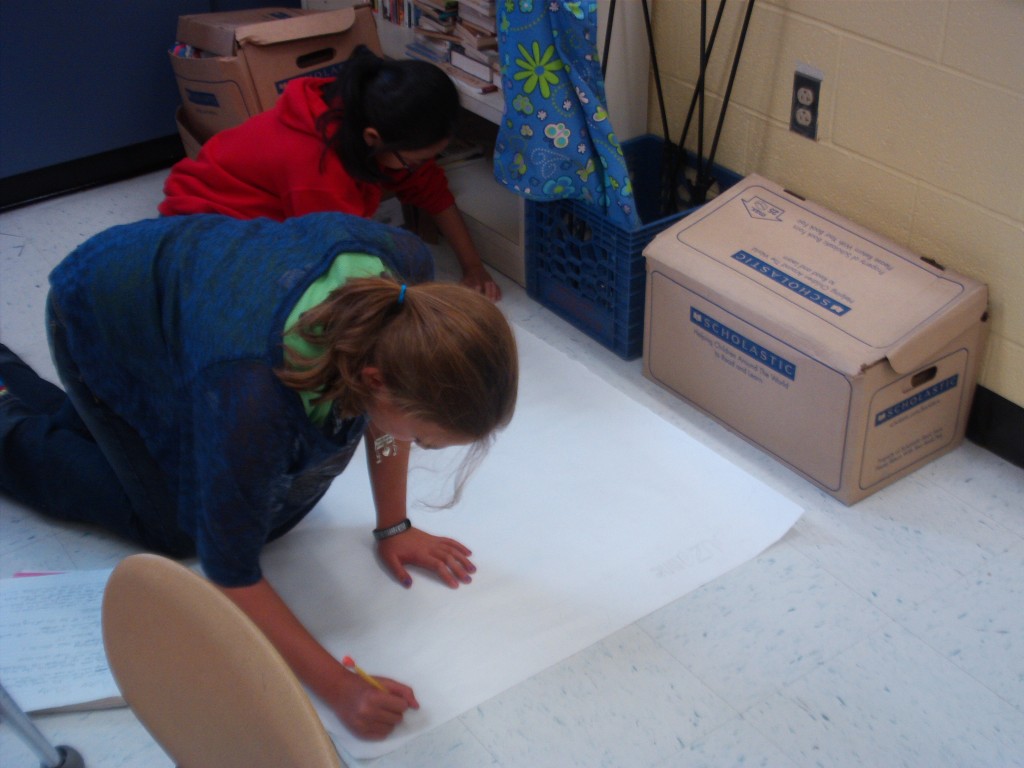We recently engaged in our first Socratic Seminar (for more information look under discussion techniques) of the year, in order to wrap up our first unit of study. The essential question of this unit -What distinguishes childhood from adulthood?- was what we focused our readings, writings, and discussions around. The purpose of a Socratic Seminar is to gain a deeper understanding of a topic, while utilizing proper discussion techniques.
In order to prepare for the Socratic Seminar (final discussion) based on our essential question, students read various short stories, informational texts, poems, and viewed videos. The last video given by a child prodigy on Ted.com on “What adults can learn from kids” garnered many new questions and raised our level of thinking. Then, students took notes and created questions from what they noticed from the readings or videos.
Some of the questions students prepared were as follows:
- I wonder why adults are so quick to say “you’re too young”?
- I wonder why there aren’t jobs for kids?
- I wonder where adults’ imaginations go?
- I wonder what the word irrational means?
- I wonder why adults underestimate kids’ abilities?
- I wonder what the word reciprocal means?
- I wonder why do adults forget about what it is like to be a child when they grow up?
- I wonder what responsibility really means for an adult? For a child?
- I wonder what adults can learn from kids?
When we first began this unit, students’ ideas of what distinguished childhood and adulthood were very literal: jobs, responsibilities, age, education. But as we navigated through this unit, students’ thinking began to change as well as looking from a different perspective. After the Socratic Seminar, students demonstrated a deeper understanding of the question (looking at the perspective of adults and children) and presented new ideas related to the topic.
Some of the new understandings were (these are generalizations):
- adults have more background knowledge to deal with various situations
- because of responsibilities, adults are less likely to take risks
- children are creative thinkers and present the idea of “Why Not”
- adults don’t want to be perceived as “childish” and sometimes give up on their dreams
- authors create bestsellers with ideas that originated in childhood
- in certain ways adults can learn from kids (thinking outside the box)
- adults want the best for their children
- adults don’t want their children to make the same mistakes that is why there are rules and boundaries sometimes
- because of background knowledge, sometimes adults don’t trust children’s judgments and ideas
Here are some excerpts from student reflections on “What distinguishes childhood from adulthood?”
- “Kids take more risks; they aren’t afraid of the future. As adults the creativeness and “outside the box” thinking seems to vanish with distractions like a job or money problems. Adults forget what it like to be a kid.” Samantha
- “Childhood is different from adulthood because in childhood you dream about many things but in adulthood you try to cancel things out with logic such as ‘Nope, too expensive’ or ‘Utterly impossible.” I think to succeed in something, you have to dream about it first.” Edward
- “Children have a lot of curiosity and take risks.” Elizabeth
- “Sometimes kids can teach adults, like Ruby Bridges.” Brandon
- “Adults don’t realize that they can learn things from kids everyday. A saying that can help kids is ‘Lend an ear today, because we are the leaders of tomorrow’.” Emily
Students got a lot out the discussion. It is not about the adults being smarter or kids thinking they are better or know more. It is about experiences, opportunities and listening to ideas. As Jillian stated in her reflection, ” I think adulthood is somewhat based on childhood itself. Without a great childhood or childhood experiences and childish memories, some of these things (authors with best sellers because of plots based on childhood, and products created by adults for children based on childhood memories) may not be accomplished.”
But as I eluded to earlier with the Socratic Seminar, the deeper understanding is important, but how we came to that deeper understanding in the discussion is essential. Students gave feedback on the discussion to each other. The glows and the grows of the discussion.
Glows
- participants brought those not speaking into the discussion
- took turns speaking
- built on each others ideas
- stayed on topic
Grows
- need more time for the discussion
- refer to the text/notes more
- speak louder
It was a great first round, and we will make sure to keep the glows and improve the grows. It was a wonderful learning experience for all.









